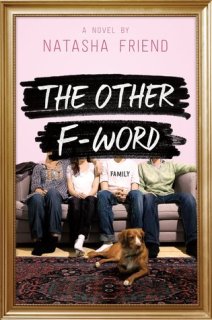In the 90s, test-tube babies, as babies conceived in vitro fertilization were called back then, were headline news and a huge topic of conversation in the LGBT community. I remember regular conversations with lesbian friends about who’d they’d prefer to have as their sperm donor if they decided to go that route to have a child. A stranger via a sperm bank? A family member? A friend? Gay guys were scrutinized on the dance floor by their lesbian friends like never before. I also had a friend who donated her eggs, which is a much more complicated and painful procedure than donating sperm.
One of the main arguments against using a sperm bank was that the kids wouldn’t know who their dad was beyond a number and some basic descriptive information. Some countered that it was the same as being adopted. There were more issues, of course, and this novel addresses many of them.
I was drawn to this book but a bit skeptical. The description gave me pause:
A fresh, humorous, and timely YA novel about two teens conceived via in vitro fertilization who go in search for answers about their donor.
Milo has two great moms, but he’s never known what it’s like to have a dad. When Milo’s doctor suggests asking his biological father to undergo genetic testing to shed some light on Milo’s extreme allergies, he realizes this is a golden opportunity to find the man he’s always wondered about.
Hollis’s mom Leigh hasn’t been the same since her other mom, Pam, passed away seven years ago. But suddenly, Leigh seems happy—giddy, even—by the thought of reconnecting with Hollis’s half-brother Milo. Hollis and Milo were conceived using the same sperm donor. They met once, years ago, before Pam died.
Now Milo has reached out to Hollis to help him find their donor. Along the way, they locate three other donor siblings, and they discover the true meaning of the other F-word: family.
Trigger alert! I thought. Such a novel could be rife with homophobic sentiments and cringe-worthy scenes of heteronormativity. I don’t read a lot of LGBT novels due to the obligatory gay bashing scene and/or homophobic attitudes presented as “facts,” but this novel is a breath of fresh air.
As the description states, the story is about a teenaged boy named Milo who lives in Brooklyn and a teenaged girl named Hollis from Minnesota, both of whom have lesbian moms. They met once when they were little kids and at the beginning of the novel are brought together again as teens. They track down more half siblings–kids whose heterosexual parents couldn’t conceive. There’s also Milo’s best friend, JJ, a major character in the story, who is adopted.
There’s so much that is gracefully packed into this story. There are the big issues at hand: what the kids struggle with, how the in vitro kids have similar yet different issues from the adopted, and how the parents cope with their own challenges regarding their decisions and fears. Also touched upon are numbing one’s feelings, dating, bullying, gender vs genes, and grief after losing a parent/partner, among other things.
I was pleasantly surprised by this tender and seemingly “real” novel. I put “real” in quotation marks because I don’t have direct experience with these issues, but I have friends who’ve dealt with a variety of them, both when they were children and now as parents. From what I know of their stories, this novel rings true.
In the end, being a teenager is hard no matter where you come from and who your parent/s is/are. As Milo’s friend JJ says, “None of them get us, dude…They’re parents.”
Title: The Other F-Word
Author: Natasha Friend
Publisher: Macmillan Children’s Publishing Group / Farrar, Straus, and Giroux (Release date: March 7, 2017)
Bottom Line: Highly recommend to teens and YA readers interested in non-traditional family stories and LGBT issues.
Source: Review copy via NetGalley

Oooh, I was cringing as I read this, waiting for something horrible to emerge (being a lesbian mom to a baby with a known donor, I'm sensitive to stories that seem to imply there's something lacking for our kids) but this sounds rather charming and good!
It's one of those wonderful novels that leaves me wondering what the characters are doing now, weeks later. LOL.
[…] The Other F-Word by Natasha Friend. A story about a group of kids who were conceived in vitro fertilization, their quest to find their biological father, and what they find along the way. […]
[…] The Other F-Word by Natasha Friend. A story about a group of kids who were conceived in vitro fertilization, their quest to find their biological father, and what they find along the way. […]